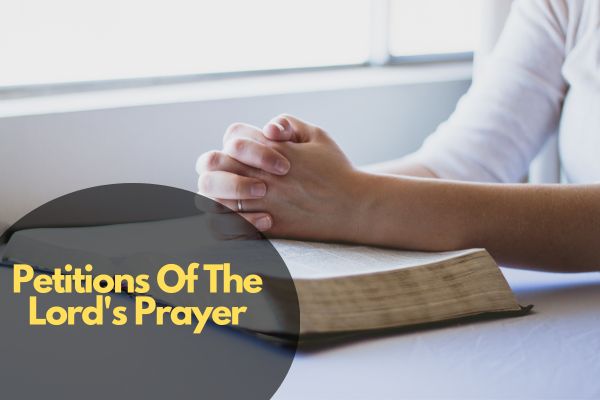The Lord’s Prayer is one of the most well-known and widely recited prayers in Christianity. It holds a special place in the hearts of believers as a profound expression of faith, trust, and dependence on God. The prayer consists of several petitions or requests that address different aspects of the human experience and the relationship between humanity and the divine. In this article, we will explore the petitions of the Lord’s Prayer, examining their meaning and significance within the context of Christian spirituality.
Petitions Of The Lord’s Prayer
The Lord’s Prayer, also known as the Our Father, is a profound and timeless prayer that holds a special place in the hearts of Christians around the world. It serves as a guide for believers to communicate with God and express their deepest desires, needs, and aspirations. At the core of the Lord’s Prayer are six petitions, or requests, that encompass various aspects of the human experience and the relationship between humanity and the divine.
1. Our Father, who art in heaven, hallowed be thy name
This opening petition establishes a foundation of reverence and recognition of God’s holiness. By addressing God as our Father, believers acknowledge their intimate relationship with Him and their reliance on His guidance and provision. Hallowing God’s name reflects a desire for His name to be honored and revered, emphasizing His divine nature and greatness.
2. Thy kingdom come, thy will be done, on earth as it is in heaven
This petition expresses a profound longing for God’s kingdom to be established on Earth and for His will to be fulfilled. It reflects an acknowledgment of the brokenness and imperfection of the present world and a plea for God’s transformative power to bring about His perfect plan. By praying for God’s kingdom to come, believers align their desires and actions with His purposes, seeking to participate in the advancement of His kingdom on Earth.
3. Give us this day our daily bread
This petition addresses the physical and material needs of individuals. It acknowledges humanity’s daily dependence on God for sustenance and provision. While it encompasses the basic necessities of life, it also extends to the spiritual nourishment required for one’s journey of faith. By praying for daily bread, believers express their trust in God’s provision and approach Him with a humble and grateful heart.
4. Forgive us our trespasses, as we forgive those who trespass against us
“This petition emphasizes the profound need for forgiveness and the importance of extending forgiveness to others. It recognizes human fallibility and the tendency to sin and make mistakes. By seeking forgiveness from God, believers acknowledge their need for His mercy and grace. In turn, by committing to forgive others, they embrace the transformative power of grace and reconciliation, fostering the restoration of relationships and the healing of wounds.
5. Lead us not into temptation, but deliver us from evil
This petition acknowledges the vulnerability of human nature and the constant spiritual battles faced by believers. It recognizes the presence of evil and the potential for being led astray. By praying for God’s guidance and protection, believers humbly seek His strength and wisdom to navigate the challenges of life. It is a plea for deliverance from the clutches of evil and a reliance on God’s power to overcome temptation.
6. For thine is the kingdom, and the power, and the glory, forever and ever
This declaration, often referred to as the doxology, is not present in all versions of the Lord’s Prayer. However, it serves as a powerful affirmation of faith and an acknowledgment of God’s sovereignty, omnipotence, and eternal nature. It is a reminder that all things ultimately belong to God and that He is worthy of all honor, power, and glory.
Practical Applications in Daily Life
Morning Reflections: Begin your day by reciting the Lord’s Prayer, setting a positive and focused tone for the hours ahead. Use this time to express gratitude, seek guidance, and commit your day to divine purpose.
Mealtime Blessings: Before meals, use the prayer to express thankfulness for the nourishment before you. It’s a simple yet profound way to recognize God’s provision in the everyday act of eating.
Evening Contemplation: Reflect on the events of the day through the lens of the Lord’s Prayer. Consider where you have aligned with God’s will and seek forgiveness for moments of deviation. Use this time for self-examination and spiritual growth.
Intercessory Prayer: Extend the petitions of the Lord’s Prayer to include the needs of others. Pray for your loved ones, community, and global concerns. This transforms the prayer into a powerful intercessory tool for positive change.
Conclusion
The petitions of the Lord’s Prayer serve as a guide for believers to express their needs, seek forgiveness, and acknowledge the sovereignty of God. Throughout history, these petitions have provided comfort, guidance, and a sense of unity among Christians. By reflecting on the Lord’s Prayer and its petitions, believers can cultivate a deeper relationship with God and align their hearts with His will. As we continue to pray the Lord’s Prayer, let us remember the significance of each petition and the transformative power of this timeless prayer.
May it continue to inspire and guide believers in their spiritual journey, reminding them of the profound truth that they are loved, forgiven, and entrusted with the responsibility of seeking God’s kingdom on Earth.




